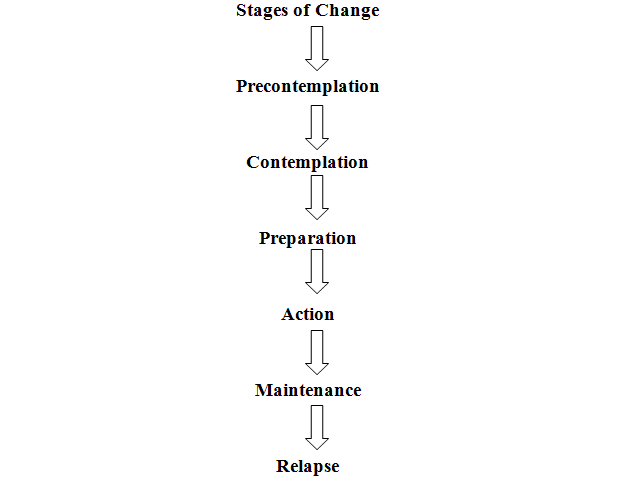6 Stages of Behavior Change: Identify the Pattern

Behavior change starts when you switch to fast food from regular healthy food when you break a new year’s resolution when you stop hitting the gym when you start being negative about all the situations, and what not! It takes a lot of commitment, emotions, and efforts to change behavior.
Also Read: 51 Self Improvement Tips To Change Life
Stages of the behavior change model are also known as the Transtheoretical Model. The Transtheoretical Method was created by DiClemente and Prochaska in the late 1970s. it was evolved during the examination of smokers who quit smoking due to further treatment.
This study was created for understanding how come people are capable of quitting smoke on their own. From this, the six stages of the behavior change model were created on the basis of decision-making and intentional change.
In this blog, I am going to cover six stages of behavior change so that you can identify your pattern and make it right. Let’s get started with stages of behavior change.

Let’s get started with the Behavior change Loop.
Whether you want to work on your dream plan, lose weight, or just quit shopping a lot… you have to set your goals accordingly and one single solution won’t work in this scenario. Choose one behavior you wish to change and try different techniques in order to achieve your goals.
You may feel discouraged while trying to change your behavior because behaviors are those habits that do not go easily. Therefore, to effectively change your behaviors recognize the pattern of stages of behavior change and work according to different techniques and solutions.

Even various researchers have introduced stages of change model in order to explain how change occurs and how one can change their behaviors. To identify the pattern, we first need to understand the phases and stages of change.
6 Stages of Change Model:
Recognition of Stages of Change Model is one of the best-known approaches to bring a good change and remove the bad habits and behavior from life. The Six stages of behavior change model was introduced in the late 1970s by James Prochaska and Carlo DiClemente.

Stage 1- Precontemplation
- Rethink
- Self-analyze and introspect
- Assess all the risks
The first stage of change is referred to as Precontemplation wherein people assess themselves on their own and start analyzing the required changes. For some of the people Precontemplation stage works as the Denial stage wherein, they know that the change is required but still refuses to change.
Suggestion- If you are passing through this stage, kindly start asking many questions and try to rethink the whole process. Self-analyze the whole changing behavior process.
Also Read: 10 Rules of IKIGAI That Will Change Your Life For Better
Stage 2- Contemplation
- Measure the pros and cons
- Confirmation of readiness and capability
- Identification of the barriers
The second stage is contemplation wherein people become aware of their potentials and benefits. After this, they evaluate all the pros and cons along with barriers to reach the goal effectively.
Suggestion- During the Contemplation stage, start asking yourself questions like is there anything that is stopping you from change, do you really want to change, what are the benefits of the change.
Also Read: S.M.A.R.T. Goals The Key To Achieve Your Aim, Manage Time, and More
Stage 3- Preparation
- Pen down your goals
- Create a plan for the action flow chart
- Stick motivating quotes on your walls
The third stage is the preparation stage wherein you prepare yourself with the goals and plan of action. You start making small changes to change bad behavior. For example, if you wish to quit smoking, you will join a health club or read a self help book.
Suggestion– when you pass through the Preparation stage make sure you pen down each and everything so that you can keep a track of your achievements and goals.
Stage 4- Action
- Treat yourself when you accomplish something
- Seek out social support if needed
The fourth stage of change is an action wherein people begin to work on their plan of actions in order to achieve goals. Meanwhile, do not forget to reward yourself every time you achieve or accomplish something. If necessary, try reinforcement to take positive healthy steps towards the change.
Suggestion- During the process, if you feel like talking to someone or getting expert advice, go for it.
Stage 5- Maintenance
- Development of coping strategies
- Do not forget to reward yourself
The fifth step of the change is Maintenance wherein you try to maintain the goals and move forward with small steps. During this step basically, you will start seeing your success. Therefore, do not forget to reward yourself whenever something good happens.
Suggestion- It might happen that you feel like giving up at this stage, therefore, prepare some coping strategies as well to fight with the situation effectively.

Stage 6- Relapse
- Identification of triggers
- Recognition of barriers
- Cope up with disappointment and frustration
The sixth stage of change is Relapse wherein you may undergo feelings of failure, frustration, and disappointment. Therefore, keep up with your self-confidence and do not give up until you reach the goal.
Also Read: 7 Really Effective Ways To Overcome Frustration & Uneasiness
Suggestions: Try to build up self-confidence during this phase.
How to Identify Your pattern of behavior Change?
To recognize the stages of behavior change, we need to look upon the below-mentioned three important points:
1. Readiness Towards Change
Have you researched how to bring a change and how to work on lasting resolutions?
2. Barriers Towards Bringing a Change
What is that one thing or element which is stopping you from bringing a change?
3. Expect Relapse
What if you try to return those bad habits or behavior again?
Limitations of the Transtheoretical Model
1. TTM theory ignored the social context wherein the changes occur, like income and SES.
2. The lines drawn among the stages of changes could be arbitrary wherein no criteria were set on how to determine the stage of change in a person. Additionally, the set of questions that were prepared to observe the stages of changes was never validated or standardized.
3. In TTM, there is no sense of clarity regarding how much duration is required to clear each stage or how long can a person take to clear a stage.
4. TTM model worked on the assumption that people make logical and coherent plans during the process of decision-making when this is not always true.
Frequently Asked Questions:
1. How many stages of behavior change are there?
There are six stages of behavior change: pre-contemplation, contemplation, preparation, action, maintenance, and relapse.
2. What are behavioral changes?
Behavioral changes are referred to any kind of modification or transformation of the behavior of humans. The behavioral change also covers a broad variety of approaches and activities that focuses on the community, individual, and environmental influences.
3. What are some examples of behavioral change?
Examples of behavioral change are increased physical activities and exercise, reduced alcoholism and drinking, reduced depression, stress, and anxiety along with the sense of subjective well-being.
I hope you like this blog. Comment down and let us know which change you want to bring in yourself. For more such content, follow Calm Sage on all social media platforms.
Thanks for reading!
You May Like These Also:
25 Ways to be Kind and Happier





















This is some really nice blog . Behavioural change is important thing in people’s life . Self analysis , root cause analysis , questioning ourselves , motivating ourselves .. keep writing ✍️